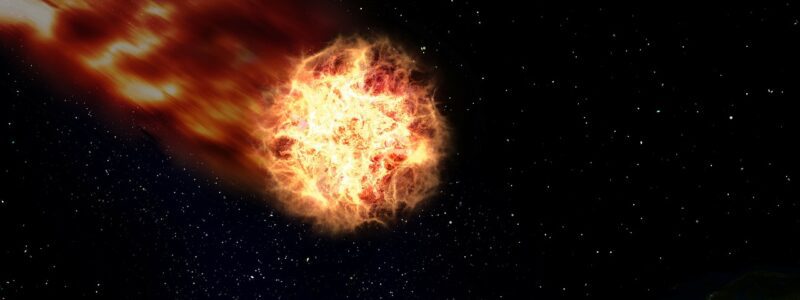Extraterrestrial Life
Life will likely be discovered on some other solar system body, even though a naturalistic origin of life seems to be quite impossible.
Life on earth has been very abundant Earth for about 3.8 billion years. We have some form of life everywhere, down to the depths of the oceans, underneath ice caps, in deserts, and deep into the earth. There is life from intense cold to near-boiling water near ocean vents.
As said in Jurassic Park – life finds a way.
When life does get discovered on another solar system object, such as Mars pictured above, there undoubtedly will be pundits pronouncing the death of the concept of God. But, on the other hand, scientists will come out of the woodwork and say life on Mars shows that the natural origin of life from chemicals is a fact.
But would that enthusiasm be merited?
Meteors and comets have ravaged the planet throughout Earth’s history. Astronomers have calculated that 200 kilograms of Earth soil on average, reside on every square kilometer of the Moon’s surface. That is a remarkable fact, for in that soil are countless bacteria. Every ton of Earth’s soil contains about 100 quadrillion microbes. While not all of these micro-organisms would survive the trip, and most would likely succumb to the harsh Moon environment, some of them likely would, particularly if housed within a rock shielded from the sun’s ultraviolet light.
The same is true about other planets, which have also been seeded with soil from the Earth. For example, it is estimated that about two kilograms of the earth are deposited on every square kilometer of Martian soil.
Microbes on Earth can withstand intense radiation, long periods without water, and extreme conditions that could survive the trip to Mars.
It seems only a matter of time before that life is discovered on a lunar or planetary surface.
Life in Other Solar Systems
No Biblical scripture explicitly excludes the possibility of life outside the solar system – perhaps on another planet orbiting another star.
Scripture permits intelligent and spiritual life as long as they have never sinned and do not need redemption. Hebrews 9:26, 28 does say concerning Christ,
He has appeared once for all at the culmination of the ages to do away with sin by the sacrifice of himself. … So Christ was sacrificed once to take away the sins of many.
This Biblical passage indicates that there was just one sacrifice for all sins; there is a strong implication that there will be only one physical, intelligent, and spiritual species in the universe that needs redemption from sin.
Astrophysical Constraints on Extraterrestrial Life
Many propose that the sheer size and immensity of the universe suggest that there must be some form of intelligent life somewhere out there. This has been the purpose of SETI, or Search for Extraterrestrial Intelligence, a massive program looking for other intelligent species.
The hypothesis is that we have been unsuccessful in communicating with an extraterrestrial because they are not out there. Still, instead, they may not want to communicate with us, or they are too far—few between to know that we exist just yet.
An alternative hypothesis is that there are not any extraterrestrials out there.
Despite the enormity of our galaxy and certainly of the entire universe, the thought that no other intelligent species is heresy to those brought up on Star Trek and Star Wars. But this enthusiasm must be tempered by fact; everywhere astronomers have looked found physical conditions that are very hostile to advanced physical life.
Our galaxy is the only one we have observed which possesses the characteristics needed to sustain advanced physical life. Likewise, our planetary system is the only one out of the thousands we have found around other stars that possess the configuration needed for advanced physical life.
The Earth is the only planet we have found out of thousands in all nine known habitable zones. And finally, the sun is the only star out of the millions we have measured insignificant details that possess physical life characteristics.
All the Universe for Us
The concept that the entire universe is for the benefit of humanity seems to be the height of self-importance. It certainly was not a concept held by Stephen Hawking, who felt it impossible to believe.
This whole vast construction [the present universe] exists simply for our sake
He noted
there does not seem to be any need for all those other galaxies, nor for the universe to be so uniform and similar in every direction on the large scale.
Research has since shown that this statement seems to be in error. There is now a growing body of knowledge that suggests the uniformity, homogeneity, size, mass, and dark energy density of the universe need to be their current values to ensure human life could be possible at any time during the universe’s existence.
No other society has seen as much evidence for the existence of a personal God as we now have. Every year brings more evidence that Scripture was correct concerning the origin of humanity, the Universe, and scientific predictions of Scripture.
Summary
The Fermi Paradox was proposed by Enrico Fermi in 1950, who asked why given there are so many stars in our galaxy, there should be many intelligent civilizations out there – “Where are they?” Solutions to the famous paradox have been offered in the decades since this paradox was first announced. For example, one team of scientists recently published a paper examining the parameters of predictive equations attempting to determine the odds of intelligent life – anywhere.
When the model is calculated with
realistic distributions of uncertainty, there is a substantial probability of there being no other intelligent life in our observable universe, and thus that there should be little surprise when we fail to detect any signs of it. This result dissolves the Fermi paradox and in doing so removes any need to invoke speculative mechanisms by which civilizations would inevitably fail to have observed effects upon the universe.
These authors conclude that.
we find a substantial probability that we are alone in our galaxy, and perhaps even in our observable universe (53%-99% and 39%-85% respectively). “Where are they?” – probably extremely far away, and quite possibly beyond the cosmological horizon and forever unreachable.
Popular “experts” such as Bill Nye (“The Science Guy”) assume humans live on an unassuming rock in a common solar system, in a common galaxy, in a common group of galaxies containing common life forms. But, unfortunately, it appears as Mr. Nye could not be more wrong.




